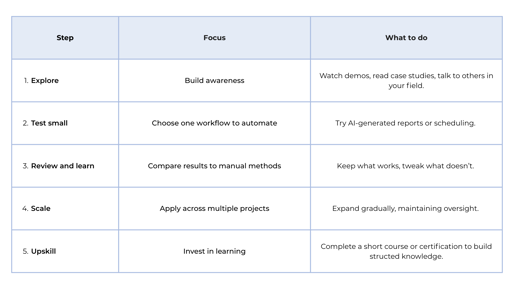What's on this page?
Jump to:
- Why AI is becoming essential in project management
- How is AI being used commonly in Project Management?
- The most popular AI-powered tools for project managers
- How AI is changing the role of the project manager
- The AI skills every modern project professional should learn
- Benefits and challenges of using AI in project management
- How to start adopting AI in your project work
- The future of AI in project management
- Final thoughts on AI in project management
- FAQs on AI in Project Management
Why AI is becoming essential in project management
Project management is evolving fast, and AI is right at the heart of that change. In fact, we recently wrote about how Project Managers are leading the global AI transformation.
From predicting risks to automating routine admin, artificial intelligence is helping project professionals save time, make better decisions, and deliver results with more confidence. It’s not about replacing people; it’s about giving Project Managers the insights and efficiency they need to lead smarter.
Last year in the UK alone, nearly a quarter (23%) of businesses reported using AI tools, according to the latest data from the Office for National Statistics. In 2026, that growth is being felt across every major industry, from construction to finance, as teams turn to AI to improve delivery, forecasting, and collaboration.
For Project Managers, this shift means opportunity.
Those who understand how to use AI to plan, monitor, and adapt will stand out in a competitive market. The best professionals aren’t fighting against technology — they’re learning to partner with it. In a world where data drives every decision, knowing how to use AI effectively could be the skill that defines your next career move.
How is AI being used commonly in Project Management?
When I speak to aspiring Project Managers, one of the most common questions I get is: “What can AI actually do in project management?”
The short answer? A lot. But here’s how it breaks down in practice:
1. Planning, scheduling and resource management
AI can analyse past project data to create smarter schedules, spot resource bottlenecks, and even suggest the best way to allocate your team’s time. It learns from previous projects, meaning every plan becomes more accurate.
2. Risk prediction and mitigation
AI models can flag risks before they escalate. By spotting trends across budgets, workloads, and timelines, they can estimate where issues are most likely to arise, giving you more time to act.
3. Predictive analytics
Instead of relying on instinct alone, AI gives you data-backed insight. It highlights where overruns are most likely and suggests where to intervene early.
4. Automation of admin
Project updates, progress reports, and task reminders can all be automated. That means less spreadsheet wrangling, and more time spent on people, strategy, and problem-solving.
5. Communication and reporting
With natural language tools like ChatGPT built into project software, PMs can generate meeting summaries, stakeholder reports, and even risk registers automatically.
This isn’t just about speed. It’s about accuracy, focus, and freeing your time for high-value work, the kind that makes great Project Managers stand out.
Did you know? Almost two-thirds of Project Managers are optimistic about AI
Recent data from the Association for Project Managers (APM) revealed that 62% of Project Managers think that the latest advancements of AI will be very positive for their industry. In 2023, this figure was just 15%.
82% of project management professionals are using AI more frequently than they anticipated five years ago, with just 18% using it less frequently than anticipated.
The last thing I want to do is add to the AI fear-mongering, but what this statistic suggests is that the risk of falling behind is very real if you resist AI adoption in the project management sector. Below, I outline some tools and approaches to make this adoption seem less intimidating.

The most popular AI-powered tools for Project Managers
You don’t need to be a data scientist to start using AI in your project work. Many of the very user-friendly, everyday project management tools you probably already know, love, and use include AI features:
-
Microsoft Project, Asana, and Jira now include AI modules that forecast deadlines and resource constraints.
-
Monday.com and ClickUp use AI to generate task summaries and automate workflows.
-
Slack and Teams bots can track project updates and nudge your team when deadlines approach.
-
Power BI and Tableau integrate AI-driven analytics to give you live insights from project data.

How AI is changing the role of the Project Manager
From my research into the Project Management job market, my understanding is that what employers in this sector are looking for is changing. They’re not just looking for people who can “keep projects on track” — they want project professionals who can use technology to make smarter decisions.
Here’s how the role is evolving:
-
From task manager to strategic advisor. With AI automating the admin, PMs are spending more time on leadership, communication, and stakeholder strategy.
-
Data fluency matters more than ever. Being able to interpret dashboards, trends, and predictions is a growing differentiator.
-
Continuous learning is key. AI evolves fast, so staying curious about new tools and features is essential.
-
Collaboration is expanding. You might find yourself working alongside data analysts, AI engineers, or automation specialists to bring insights to life.
My top tip? You don’t need to be an expert to use AI effectively in project management
You don't need to be a world-leading AI thought leader to effectively use AI as a project manager; you just need to learn how to use AI for managing projects.
This might sound like an over-simplification, but what I mean is that you should learn AI in a vocational way, putting your efforts into learning the skills, practices, and software that project managers actually need in their sector. While many courses might promise to broadly "teach you AI", what you need is to sharpen specific skills that will give you the edge in the project sector.
That's why our AI for Project Managers programme brings together industry-relevant learnings — like how to improve risk management, stakeholder analysis, and project visualisation — into focused training modules, so we don't overwhelm project managers with the broad-strokes approach. This helps them learn the AI skills they truly need.
The AI skills every modern project professional should learn
Here’s where I’d suggest focusing your upskilling efforts if you want to stay ahead:
-
AI fundamentals – understand the basics of models, data, and how machine learning works.
-
Data literacy – interpreting data visualisations, dashboards, and metrics.
-
Ethical awareness – understanding the responsible use of AI and bias in algorithms.
-
Practical tool experience – getting familiar with AI features in tools you already use daily.
-
Communication and leadership – translating complex insights into clear, actionable plans.
Combined, these skills will help you bridge the gap between technology and teamwork, which is something every modern project needs.
The most successful Project Managers aren’t necessarily the most technical; they’re the ones who know how to connect people, data, and tools to achieve better outcomes. By building a balanced mix of technical understanding and human-centred skills, you’ll be well placed to lead projects that are both innovative and grounded in real-world results.
Fact: The use of AI in construction projects has increased by 60% in two years
A recent survey by the Association for Project Management (APM) found that from 2023 to 2025, the use of AI in construction projects has jumped from 15% to 75%.
Respondents also reported broad improvements in construction project management thanks to AI:
- 62% in resource allocation
- 58% in reporting and dashboarding
- 52% in risk analysis and forecasting
- 48% in task and schedule automation
- 45% in stakeholder communications

Benefits and challenges of using AI in project management
Benefits
-
Smarter planning: predictive scheduling reduces delays and budget overruns.
-
Better risk management: AI can surface potential issues before humans might spot them.
-
Time savings: automation of admin means less time reporting, more time leading.
-
Continuous improvement: AI learns from previous projects, improving accuracy over time.
Challenges
-
Skills gap: The most significant technical skills gap faced by UK businesses is in understanding AI concepts and algorithms: a staggering 60% reported having an AI skills gap.
-
Data quality: AI models need accurate, consistent data to be effective.
-
Cultural resistance: not everyone’s ready to trust AI recommendations yet.
-
Governance: as AI use grows, so does the need for clear ethical and compliance frameworks.
Understanding both the opportunities and limits of AI is what makes a project professional valuable — not just tech-savvy, but balanced and informed.
How to start adopting AI in your project work
Good news: if you're already working in project management, and are feeling a bit stumped or anxious about where to start with bringing AI into the mix, there are safe, simple, quick ways to do this.
Here's my suggestion below:

It’s also worth remembering that adopting AI isn’t about doing everything at once.
The best Project Managers start small, stay curious, and build confidence step by step. You might begin by using AI to tidy up meeting notes or forecast simple timelines before moving on to more advanced analytics. Treat it like any other skill — something to practise, experiment with, and improve over time. The goal isn’t perfection; it’s progress, and every small win helps you work more intelligently and efficiently.
The future of AI in project management
Looking ahead, I expect AI will become as normal a part of project work as Gantt charts once were. Emerging trends include:
-
Conversational AI that allows PMs to manage projects using natural language prompts.
-
Explainable AI models that make predictions more transparent and trustworthy.
-
Adaptive project systems that learn from outcomes and automatically improve.
-
Integration with enterprise platforms like ERP, CRM, and BI systems, creating a single source of project truth.
This shift also aligns with the UK government’s long-term priority of skills strategy and 10-year infrastructure strategy: AI and project management are critical growth areas for the next decade.
Hear from a project management student
Ollie shares his incredibly unique tale of how he went from working for Learning People, to studying with us - including completing a course in AI skills! With no prior experience in the field, but a wealth of knowledge of the industry, and support from Career Services, Ollie is now working as a Junior Project Manager.
Final thoughts on using AI in project management
Becoming an AI-fluent Project Manager isn't about becoming a world-leading AI expert. It's about knowing the skills that employers are looking for in this sector in 2026, such as ethical prompting and AI-driven risk management strategies, and honing in on them.
The best Project Managers of tomorrow will be those who embrace it early, use it wisely, and balance it with strong leadership and communication skills.
So, whether you’re just stepping into project management or ready to move into a more senior role, understanding AI will help you make better decisions, lead more efficiently, and future-proof your career.
And if you’d like some help figuring out which AI certification or project management training you need to achieve your 2026 career goals, we’d love to chat: that’s exactly what our team is here for.
FAQs on Using AI in Project Management
Related Articles
 Career Progression
Career ProgressionShould I Progress in My Current Career or Change Career?
Feeling unsure about which career route to take? Learn how to decide whether to progress in your current career or change direction, with practical advice from career advisors.
Read More Career Progression
Career ProgressionHow to Prepare for a Job Interview (Including for a Career Change)
Learn how to prepare for a job interview, including online and career-change interviews, with practical advice from an experienced career advisor.
Read More (New) Job Advice
(New) Job AdviceCorporate Jargon and Office Lingo: A List With Explanations and Examples for New-Starters
Corporate jargon or office lingo can be confusing or even intimidating if you're not used to it. This plain-English guide explains common workplace phrases so new-starters can follow conversations with confidence from day one.
Read More Career Progression
Career ProgressionHow to Negotiate Salary
Learn how to negotiate your salary with confidence. Get clear steps, example wording, and expert advice to secure a better pay rise or job offer in the UK.
Read More

